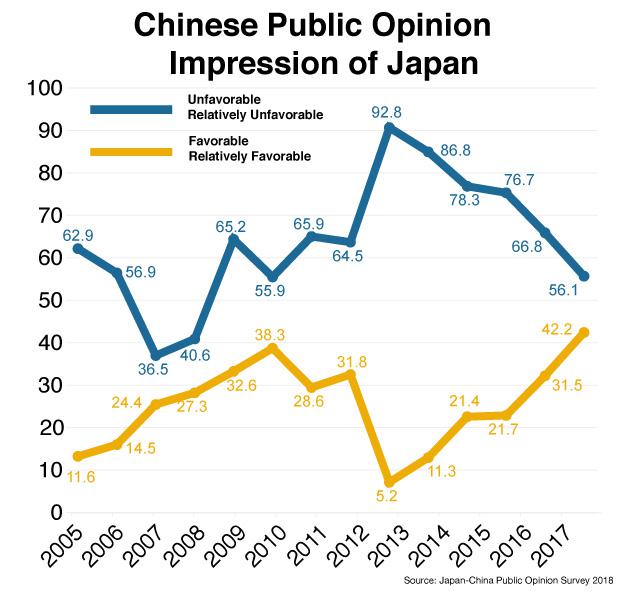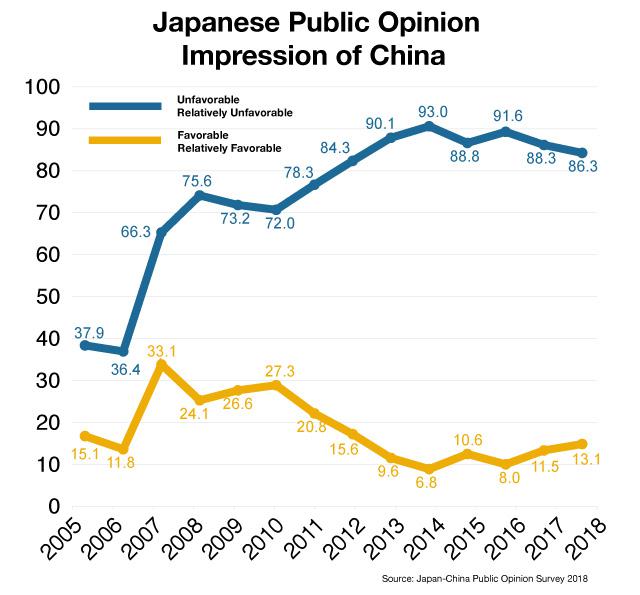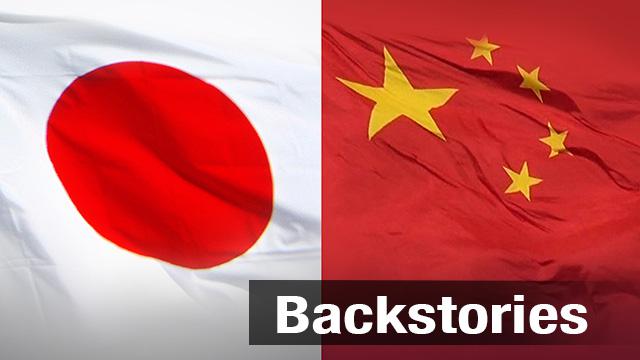The survey is conducted annually by Genron NPO, a Japanese non-profit, and China International Publishing Group, a China-based foreign language publishing house. 1,000 Japanese people and 1,548 Chinese people from 10 major cities in China responded.
Chinese respondents were first asked about their impression of Japan. 42.2 percent said they have "favorable" or "relatively favorable" impressions, up from 31.5 percent last year. Those with "unfavorable" or "relatively unfavorable" impressions dropped significantly from 66.8 to 56.1 percent.

One factor behind the change is an increase in Chinese visitors to Japan. They come in contact with Japanese people while in the country, resulting in better feelings toward them.
But more importantly, political ties between the countries have improved. Reciprocal visits by their leaders have resumed. In May, Li Keqiang became the first Chinese premier to make an official visit to Japan in seven years. And later this month, Japanese Prime Minister Shinzo Abe is scheduled to visit China and meet President Xi Jinping.
I accompanied Japanese business leaders on a recent trip to Beijing to meet Li. During the trip, there was a scene that made me think the distance between Japan and China is shrinking. The trip is organized every year by a group promoting economic exchanges between the two nations called the Japan-China Economic Association. During the trip, the Japanese delegation always presents the Chinese with a booklet of requests. Deregulation is one that has been included. The goal is to create a favorable business environment in China for Japanese companies. The companies actually compile a more comprehensive booklet for themselves with more detailed requests, but they keep it to themselves. This year, Akio Mimura, chairman of the Japan Chamber of Commerce and Industry, mentioned it, saying he was not going to hand the booklet to the Chinese officials because it was too thick. But Li asked Mimura if he could have it, going on to say he always finds the concerns raised by the Japanese rational, and that he believes the relevant departments are working on them. Last year, that would have been the end of the conversation. But this time, Li said he didn't feel assured and ordered a high-ranking government official to urge the departments to solve the problems.

A Japanese business leader who was there told me she felt that Li was trying to convey the message that China is keen to boost ties with Japan.
China is a deeply hierarchical society and people consider what their superiors would think when they act. (Similar to Japan, but much more deeply-rooted.) If the Communist Party's top leadership are demonstrating rapport with Japan, this would encourage senior officials of local governments to boost exchanges with Japanese companies. That would allow private Chinese companies to do business with Japan free of worries. I believe the improvement in political ties is one factor behind the change in Chinese sentiment toward Japanese people.
Another factor behind the improved impressions is China's trade friction with the United States. The Trump administration has accused China of violating intellectual property rights, slapping steep tariffs on Chinese goods. China retaliated with similar measures and the two countries have plunged into a trade war. Recently, Vice President Mike Pence said "China built the foundation of its manufacturing sector at the expense of the United States." China's Foreign Minister Wang Yi hit back, urging the US to stop "erroneous words and actions." The relationship between Washington and Beijing has reached the point that some experts say we are seeing the beginning of a new Cold War.
Against this backdrop, the survey asked Chinese respondents which relationship is most important for their country. 23.3 percent said the United States, down from 28.4 percent last year. Those who selected Japan rose from 12 to 18.2 percent.

On the other hand, there seems to be little change in how Japanese people view China. The percentage of Japanese respondents with "favorable" or "relatively favorable" impressions of China was 13.1 percent, only slightly higher than last year's 11.5 percent.
Those with "unfavorable" or "relatively unfavorable" impressions went down from 88.3 to 86.3 percent. But again, the difference is small. Nearly 90 percent of Japanese people still have unfavorable impressions of China.

The survey also asks respondents the reasons for their unfavorable impressions, allowing them to choose more than one answer.
The greatest factor was "continuing territorial issues over Senkaku Islands and Japanese waters/airspace," which also topped last year's list. Japan controls the islands. The Japanese government maintains the islands are an inherent part of Japan's territory. China and Taiwan claim them. This was followed by "actions that go against international rules," and "criticism of Japan over historical issues." The number of those who cited Chinese actions that go against international rules was up 8 percentage points from the year before.

China's past behavior may have contributed to this view. For instance, the country rejected an international arbitration tribunal's ruling denying part of its territorial claims in the South China Sea, calling the decision "waste paper."
But trade frictions with the United States seem to be the main factor behind this year's jump. The escalating trade war has highlighted Chinese actions that go against the spirit of free trade, such as its failure to protect intellectual property rights.
The sharp contrast highlighted in this year's survey between improved sentiment toward Japan among Chinese respondents and the unimproved sentiment toward China among Japanese respondents has some experts worried that the imbalance could cause bilateral ties to sour again in the future.
The survey also asked what would be essential in improving the bilateral relationship. "Strengthening trust between the two governments" was the most cited factor among Japanese respondents, followed by "resolving territorial issues with the Senkaku/Diaoyu Islands," "resolving historical perception issues," and "increasing interaction between the two countries' leaders." The same 4 factors were chosen by Chinese respondents, though in a different order.
Territorial disputes and differences in historical perception will be hard to resolve. But deepening trust between the governments and increasing interaction between leaders is a good first step. Doing so keeps open communication channels and allows for deeper discussions on the countries' respective positions.
The relationship between the two countries has a long history, and it has improved and deteriorated in the past. Hopefully this time, friendly ties will be maintained for a long time.

